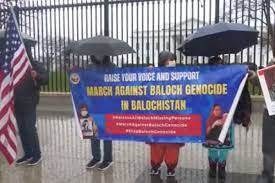Misrepresentation and Estrangement
The recent pronouncements by Balochistan’s Premier, Anwaar-ul-Haq Kakar, concerning the ongoing protests in Islamabad have sparked a contentious debate. His statements, particularly noteworthy given his heritage, seem to minimize the very essence of the challenges faced by the people of his province: Balochistan.
Balochistan’s Premier’s Words Spark Contentious Debate
Urging advocates of the demonstration to “consolidate their forces with the militants” is an oversimplified portrayal of the intricate complexities plaguing Balochistan. It is crucial to understand that the Islamabad demonstration is a cry for help, a desperate plea for the return of vanished loved ones, and a defiant stand against extrajudicial actions. These protestors are exercising their fundamental right to peacefully seek answers and justice.
Balochistan’s Cry for Help Unheard
Attempts to brand demonstrators and their supporters as insurgents’ sympathizers are a gross misrepresentation. This narrative not only belittles the legitimate grievances of the Baloch people but also potentially puts at risk the lives of activists, journalists, and human rights champions who stand in solidarity with them.
Dissenting Voices Silenced with Disinformation
Denouncing the media and activists for “misleading” the public and endangering the state is a disturbing display of intolerance towards dissent and criticism. The role of the media and civil society in shining a light on human rights concerns is vital in any democracy, and disparaging the demonstrators only serves to weaken the nation’s democratic fabric.
A Call for Empathy and Constructive Dialogue
It is imperative for all our leaders, particularly those with firsthand knowledge of afflicted regions, to adopt a more empathetic, understanding, and constructive approach. Dialogue, not estrangement, is the key to resolving long-standing problems.
Building Bridges, Not Chasms
The critical need of the hour is for our leadership to re-evaluate their stance and work towards building bridges, not widening chasms. The people of Balochistan deserve compassion, understanding, and, most importantly, a commitment to addressing their legitimate grievances.
In the words of another esteemed Baloch figure, Chief Justice Qazi Faez Isa, “This nation belongs to all of us.” It is fundamental for leaders to acknowledge the nuanced realities of the Balochistan issue, fostering an environment of empathy and collaboration rather than inflaming tensions.
Respecting Dissent and Seeking Harmony
A dedication to constructive dialogue and respect for the democratic principles of dissent will be instrumental in bridging gaps and forging a more unified and harmonious nation. Balochistan, like any other region, deserves to be heard, understood and addressed with sincerity and compassion by its leaders.
Demonstration in Islamabad
It is crucial to acknowledge that the demonstration in Islamabad is an entreaty for assistance, a supplication for the retrieval of missing loved ones, and a defiance against extrajudicial measures. The demonstrators are exercising their fundamental entitlement to peacefully petition for explanations and fairness.
Efforts to depict demonstrators and their adherents as sympathizers of insurgents constitute an unjust representation. This narrative not only belittles the valid grievances of the Baloch populace but also potentially imperils the lives of advocates, correspondents, and champions of human rights who stand in unity with them.
Empathetic Environment for Balochistan
It is pivotal for leaders to recognize the nuanced intricacies of the Balochistan issue, fostering an environment of empathy and cooperation rather than exacerbating tensions.
A commitment to constructive dialogue and respect for the democratic principles of dissent will be instrumental in bridging gaps and fostering a more unified and harmonious nation. Balochistan, like any other region, deserves to be heard, understood and addressed with sincerity and compassion by its leaders.


